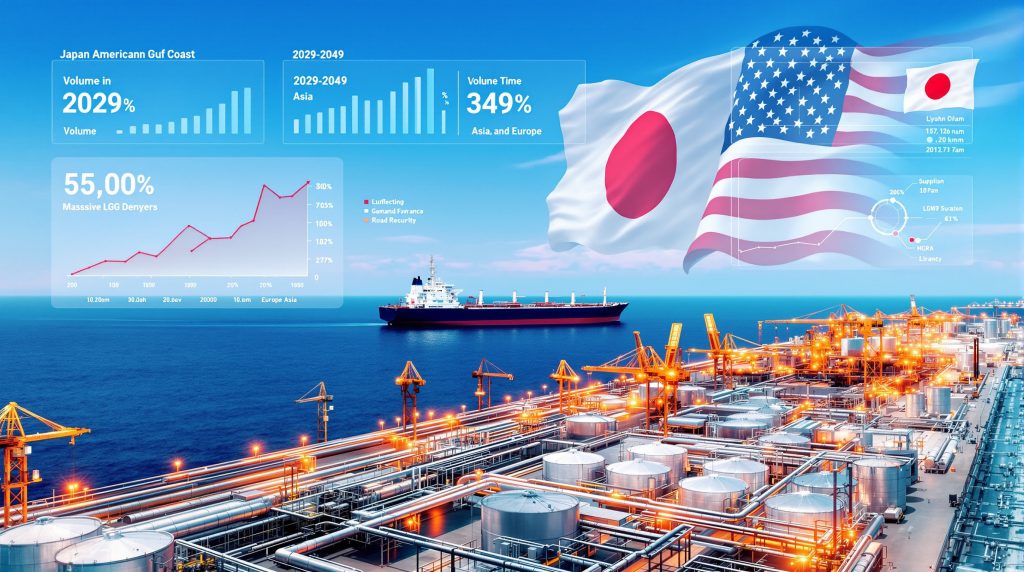Understanding Japan's Strategic Energy Partnership
Japan's Mitsui has finalised a groundbreaking energy agreement that fundamentally transforms its natural gas supply chain through 2049. The trading giant secured a binding contract to purchase 1 million tonnes per annum of liquefied natural gas from U.S. producer Venture Global, establishing one of the most substantial long-term energy commitments between Japanese and American companies in recent memory. This strategic partnership addresses critical energy security insights that Japan faces in its evolving energy landscape.
Contract Specifications Overview:
| Element | Details |
|---|---|
| Annual Volume | 1 million tonnes per annum |
| Duration | 20 years (2029-2049) |
| Delivery Terms | FOB basis |
| Distribution Scope | Japan, Asia, Europe |
| Announcement | November 11, 2025 |
This partnership represents approximately 1.7% of Japan's target to secure 60 million tonnes through long-term contracts by fiscal year 2040-2041, according to estimates from the country's Ministry of Economy, Trade and Industry.
How Japan's Energy Security Vulnerabilities Drive Strategic Partnerships
Japan's energy infrastructure confronts mounting challenges from renewable intermittency and evolving geopolitical landscapes. Furthermore, the nation continues to grapple with energy export challenges that affect regional market dynamics. The Mitsui-Venture Global agreement directly targets three fundamental weaknesses in the nation's energy framework.
Primary Security Benefits Include:
- Reduced Spot Market Exposure: Long-term pricing stability versus volatile short-term purchases
- Supply Chain Diversification: Decreased dependency on concentrated regional suppliers
- Grid Stability Enhancement: Essential backup power during renewable generation fluctuations
Japan's projected annual demand fluctuates between 53-74 million tonnes, representing a 40% variance that necessitates flexible supply arrangements. Long-term contracts provide crucial protection against supply disruptions whilst mitigating surplus risks that have historically challenged Japanese energy planners.
The partnership reflects recognition that thermal power generation remains indispensable for grid reliability as renewable capacity expands nationwide, with renewable output remaining heavily dependent on weather conditions.
Venture Global's Strategic Advantages in Pacific LNG Markets
Venture Global's Louisiana-based operations position the company advantageously for trans-Pacific shipping routes to Asian markets. However, oil price dynamics continue to influence overall energy market conditions. The Gulf Coast location provides direct access to major shipping channels whilst reducing transit times compared to alternative U.S. export facilities.
Key Operational Strengths:
- Geographic Positioning: Louisiana facilities enable efficient Pacific routing
- Production Flexibility: Multiple facility developments support scalable supply arrangements
- Advanced Technologies: Modern liquefaction systems enhance operational efficiency
- Export Infrastructure: Established port facilities streamline international deliveries
The FOB delivery terms transfer responsibility to Mitsui upon loading at export terminals, providing the Japanese company with routing flexibility to optimise commercial conditions across different regional markets.
Operational Excellence and Delivery Mechanisms
The agreement's structure reflects industry best practices for long-term LNG supply arrangements. Consequently, both parties benefit from established operational protocols that minimise delivery risks whilst maximising commercial flexibility.
Strategic Buffer LNG Initiative Reshapes Market Dynamics
Japan's Ministry of Economy, Trade and Industry implemented the Strategic Buffer LNG reserve scheme, mandating monthly spot purchases starting January 2026. In addition, geopolitical trade impacts continue to influence Japan's energy security planning. This initiative creates sustained baseline demand beyond traditional consumption patterns.
Program Implementation Details:
| Component | Specification |
|---|---|
| Launch Date | January 2026 |
| Purchase Frequency | Minimum one cargo monthly |
| Annual Impact | Approximately 12 cargoes baseline |
| Strategic Purpose | Geopolitical risk mitigation |
| Market Effect | Increased spot demand floor |
The monthly cargo requirement translates to approximately 1 million tonnes annually in strategic reserves, assuming standard LNG carrier capacities of 80,000-110,000 tonnes per vessel. This program reflects Japan's proactive approach to securing stable LNG supply amid rising geopolitical tensions.
Market Stability Through Strategic Reserves
For instance, the buffer initiative provides Japan with enhanced negotiating power during supply disruptions. Furthermore, it creates a foundation for market stability that benefits both domestic consumers and international trading partners.
Economic Implications of Japan's Long-Term Contract Strategy
Japan's energy ministry projects that securing 60 million tonnes through long-term contracts by fiscal year 2040-2041 could optimise national LNG import costs across an estimated demand range of 53-74 million tonnes annually. Moreover, US natural gas forecasts suggest continued price volatility in North American markets.
Cost Optimisation Framework:
- Price Stability Benefits: Reduced average import costs through contractual predictability
- Demand Planning Flexibility: Accommodates consumption variations across the projected range
- Risk Management: Protection against supply shocks and price volatility
- Commercial Efficiency: Minimised exposure to cyclical spot market pressures
Long-term LNG contracts typically employ various pricing mechanisms, including oil-indexed formulas, hybrid pricing combining fixed components with indexation, or LNG index-based assessments. However, whilst specific pricing terms for the Mitsui-Venture Global deal remain undisclosed, the structure provides both parties with revenue predictability and cost management capabilities.
Financial Risk Distribution
The agreement's financial structure distributes risks between both counterparties effectively. Consequently, this arrangement supports Japan's broader energy security objectives whilst providing Venture Global with stable revenue streams for future investments.
Strengthening Japan-U.S. Energy Cooperation Framework
The agreement exemplifies deepening energy relationships between Japan and the United States as both nations navigate complex global energy transitions and geopolitical realignments. This partnership creates mutual strategic value extending beyond traditional commodity trading relationships.
Bilateral Cooperation Elements:
- Energy Security Alignment: Complementary supply-demand stability objectives
- Technology Collaboration: Shared expertise in LNG production and distribution systems
- Market Stabilisation: Reduced dependence on volatile spot trading mechanisms
- Infrastructure Development: Enhanced trans-Pacific energy transportation networks
The timing of this agreement coincides with broader U.S. efforts to expand LNG export capacity. Furthermore, Japan seeks to diversify its energy import portfolio beyond traditional suppliers in the Middle East and Southeast Asia.
Strategic Alliance Benefits
This partnership strengthens bilateral economic ties whilst enhancing energy security for both nations. In addition, it demonstrates the effectiveness of long-term commercial relationships in addressing complex geopolitical challenges.
Regional Distribution Strategy Maximises Commercial Flexibility
Mitsui plans strategic distribution across Japan, broader Asian markets, and European destinations. This diversified approach optimises commercial flexibility whilst serving various customer segments across multiple continents.
Distribution Strategy Benefits:
- Arbitrage Opportunities: Capitalise on regional price differentials
- Customer Base Expansion: Serve diverse industrial and utility clients
- Supply Chain Resilience: Multiple delivery destinations reduce concentration risks
- Market Optimisation: Flexible routing based on evolving demand conditions
The FOB delivery basis enables Mitsui to redirect cargoes to whichever markets offer the most favourable commercial terms at delivery time. Consequently, this provides significant operational flexibility in an increasingly volatile global energy environment.
Commercial Arbitrage Opportunities
The multi-regional distribution strategy allows Mitsui to capitalise on price differentials between markets. For instance, European markets often command premium pricing during winter months, creating additional commercial value opportunities.
Renewable Energy Integration Drives Continued LNG Demand
Despite aggressive renewable energy expansion plans, Japan acknowledges that natural gas will remain essential for grid stability through 2050. LNG-fired generation provides crucial backup power during renewable output shortfalls whilst supporting frequency regulation requirements.
Integration Challenges and Solutions:
| Challenge | LNG Response |
|---|---|
| Weather Dependency | Reliable backup during low renewable periods |
| Grid Frequency | Rapid response for stability maintenance |
| Seasonal Variations | Flexible generation during peak demand |
| Transition Support | Bridge fuel during decarbonisation process |
Renewable power systems exhibit inherent instability due to weather dependencies, creating ongoing requirements for dispatchable thermal generation. However, LNG-fired combined cycle plants can typically achieve full output within 1-2 hours from cold start, providing essential grid balancing capabilities that intermittent renewables cannot match.
Grid Stability Requirements
The technical challenges of maintaining grid stability with increasing renewable penetration necessitate flexible thermal generation capacity. Furthermore, Japan's Mitsui to buy LNG from Venture Global agreement supports this transition by ensuring reliable backup power availability.
Competitive Advantages Through Strategic Partnership
The 20-year contract duration provides both companies with substantial competitive positioning advantages in their respective markets. This creates value that transcends simple commodity transactions.
Mutual Strategic Benefits:
- Mitsui Advantages: Secured supply enables competitive downstream pricing and customer retention
- Venture Global Benefits: Guaranteed revenue stream supports facility expansion and operational planning
- Market Positioning: Enhanced credibility and negotiating power in global LNG markets
- Investment Security: Long-term commitments attract additional infrastructure development capital
The 1 million tonnes annual volume represents material scale in global LNG trade context, historically comprising 1-2% of worldwide LNG transactions. This scale provides both parties with significant leverage in future commercial negotiations whilst demonstrating commitment to long-term energy partnership principles.
Market Positioning Advantages
The partnership enhances both companies' market credibility significantly. In addition, it provides a foundation for future commercial expansion and strategic alliance development across the Asia-Pacific region.
Technical Considerations and Market Impact Analysis
The agreement incorporates several technical elements that influence both operational execution and broader market dynamics. Standard LNG carrier capacities typically range from 135,000-180,000 cubic metres, translating to approximately 80,000-110,000 tonnes per cargo depending on vessel specifications and loading efficiency.
Operational Technical Factors:
- Shipping Logistics: Trans-Pacific routes require 2-3 weeks transit time
- Storage Requirements: Receiving terminals must accommodate delivery scheduling
- Regasification Capacity: End-user facilities need adequate processing capabilities
- Quality Specifications: Contract likely includes heating value and composition standards
The Louisiana Gulf Coast export location provides optimal access to Pacific shipping lanes. However, it avoids potential bottlenecks that could affect East Coast or other regional export facilities during high-demand periods.
Infrastructure Requirements
The technical success of this arrangement depends on robust infrastructure across the entire supply chain. Furthermore, both parties must maintain operational excellence throughout the 20-year contract duration.
Risk Mitigation and Future Market Considerations
Long-term LNG contracts provide essential risk mitigation for both supply security and price volatility, particularly important given Japan's high dependence on energy imports. Moreover, Venture Global needs revenue certainty to support ongoing facility investments.
Risk Management Elements:
- Supply Continuity: Contract duration spans multiple economic cycles
- Price Protection: Likely includes mechanisms to limit extreme price movements
- Force Majeure Provisions: Standard protections for extraordinary circumstances
- Flexibility Mechanisms: Potential volume adjustments for changing market conditions
The agreement's timing reflects anticipation of continued global LNG market growth. For instance, Asia-Pacific regions where economic development drives increasing natural gas demand for both power generation and industrial applications.
Long-term Market Outlook
The partnership between Venture Global and Mitsui positions both companies advantageously for future market developments. Consequently, Japan's Mitsui to buy LNG from Venture Global creates a foundation for sustained commercial success.
Frequently Asked Questions
Why establish a 20-year contract duration for LNG supply?
Extended contract periods provide price predictability and supply security whilst enabling both parties to justify major infrastructure investments. Furthermore, confident revenue projections and cost planning become possible through long-term arrangements.
How does this agreement compare to other major Japanese LNG contracts?
The 1 million tonnes per annum represents significant volume, though specific pricing comparisons remain challenging. However, confidential commercial terms across different supplier relationships limit detailed comparative analysis.
What flexibility exists if Japan's energy landscape changes dramatically by 2049?
Long-term contracts typically include flexibility mechanisms for volume adjustments, whilst LNG can serve multiple purposes. For instance, industrial feedstock applications exist beyond power generation requirements.
How might this affect global LNG pricing in other markets?
Large long-term contracts remove supply volumes from spot markets, potentially creating upward pressure on short-term prices. However, they provide overall market stability through reduced volatility.
What happens if renewable energy adoption exceeds current projections?
Natural gas will likely maintain importance for grid stability, industrial processes, and backup generation. Furthermore, technical challenges of achieving 100% renewable grid operation ensure continued LNG demand even with accelerated renewable deployment.
This analysis reflects market conditions and regulatory frameworks as of November 2025. Energy market dynamics, government policies, and commercial arrangements may evolve, potentially affecting the strategic implications discussed herein.
Looking for Strategic Energy Investment Opportunities?
Discovery Alert's proprietary Discovery IQ model delivers real-time alerts on significant ASX mineral discoveries, instantly empowering subscribers to identify actionable opportunities ahead of the broader market. Begin your 30-day free trial today and secure your market-leading advantage in the evolving energy and resources sector.




